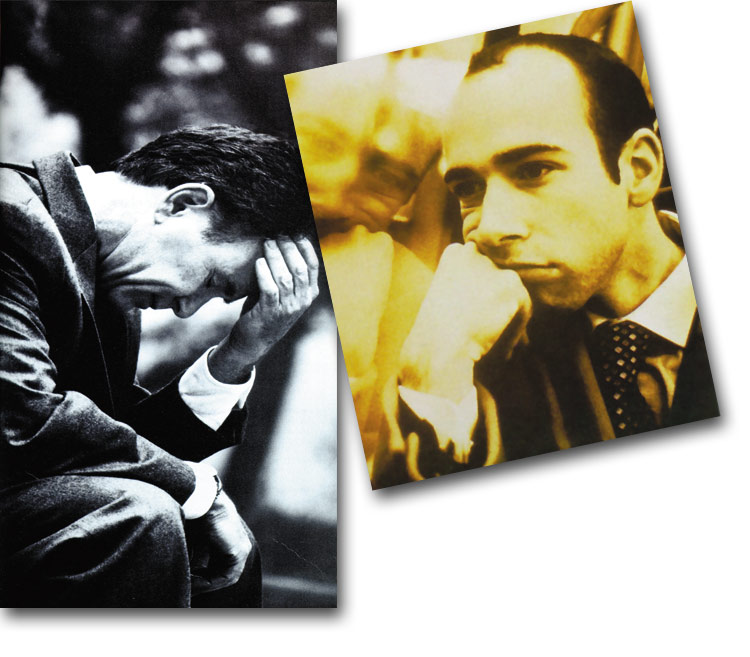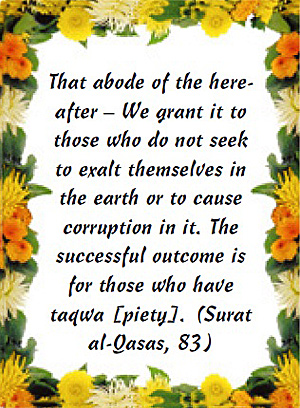People who live ostentatious lives but are then abandoned to loneliness in their old age are proofs of the lack of loyalty in irreligious societies.
Disbelief has various negative impacts upon human beings and societies alike. In a society far removed from religion, the basic characteristics of its members are injustice, selfishness and untrustworthiness; this is inevitably the nature of disbelieving societies. Only the values of religion assure moral perfection for societies and individuals. Those having faith in Allah and the hereafter conduct themselves responsibly, since they only live to attain the approval of Allah. Fearing Allah, they cautiously avoid wicked deeds, attitudes and behavior not praised by Allah. A society dominated by such people becomes one that does not experience social problems.
However, a disbelieving person, failing to recognize that he will ultimately be rewarded or punished for his deeds, does not observe the limits of Allah. Disregarding the Day of Judgment, he simply does not see any necessity to curb his wickedness. Despite avoiding certain socially unfavorable forms of behavior, many people do not hesitate to commit other evils when they are urged, encouraged to, or have an opportunity.
For someone who shows his preference for disbelief, his troubles begin while he is still in this world, since everyone, deep in his heart, knows that he should adhere to the values of religion. Surely everyone is endowed with the faculty of conscience. But while this mechanism is very fine-tuned in believers, it becomes almost dysfunctional in those who do not live by the values of religion. In other words, by paying no heed to their conscience, people who have drifted apart from the values of religion experience spiritual distress. Everyone, in reality, knows that he has a Creator, that he is responsible to Him and that he should display moral perfection. Yet, these proper attitudes are essentially in conflict with his worldly whims and desires.
That is why individuals either entirely reject religion, or find excuses, in their own eyes, such as "I am honest, good and sincere" so as to avoid the way of living described in the Qur'an. However, in both cases, people know in their subconscious mind that they should lead the type of life approved of by Allah. In societies distant from the values of religion, the basic source of all mental anguish, all psychological and spiritual problems is this spiritual distress which we call "pangs of conscience."
The state of those who start to experience this grief while they are still in this world is expressed in the following verse:
They say: When will this promise be fulfilled if you are telling the truth? Say: "It may well be that some of what you are anxious to hasten is right on your heels." (Surat an-Naml: 71-72)
"Pangs of conscience" are only a minor part of the eternal and unbearable spiritual grief a non-believer feels in the hereafter. The reason why man suffers from this worldly pain is because he prefers to maintain a way of living, attitude and outlook contrary to his purpose in creation. As long as he persists in his irreligious attitudes and mentality, he is doomed to suffer from spiritual grief. That is why he feels the urge to find ways to silence the voice of his conscience and hence find relief from mental suffering.
Mentally and physically, man is naturally inclined towards the values of religion. Allah has surely created not only man but also the most proper way of living for him. Therefore, transgressing beyond the boundaries of Allah naturally leads to personal and sociological complications. As mentioned in the preceding pages, these complications are actually the social and personal miseries, which have had a negative impact upon humanity throughout history. The one and only way to eradicate these complications is adherence to the values of religion. Religion brings solutions to each one of these complications in a very real sense.
There is no reason why any person who does not live by the values of religion, and who therefore is not expecting to be judged by his deeds and ultimately punished, should observe the limits set by Allah and work for the good and interest of others in order to attain Allah's approval. According to his mistaken beliefs, given that he has only one opportunity to live in this world, he thinks he should lead his life in the most comfortable conditions, go after anything he wants and be able to do anything he desires. This rationale is put as follows in the Qur’an:
They say, "There is nothing but our existence in the world. We die and we live and nothing destroys us except for time." They have no knowledge of that. They are only conjecturing. (Surat al-Jathiya: 24)
Anyone with such a mistaken approach is vulnerable to all kinds of wickedness or immorality. He may unabashedly lie, steal, break his promises, resort to violence, take lying for granted, defraud, or exploit the labor and resources of others whenever he has the opportunity. There is simply nothing to hold such a person back from evil.
In time, being enslaved by his ego (lower soul), he obeys its commandments without any hesitation. He sees no limits to the wickedness he can engage in. If it is in his interests, he sees no reason not to commit murder. Daily newspapers run headlines about such incidents. Their pages are full of tragic stories about people killing their neighbors for jewelry, women killing their husbands out of rage, fathers torturing their children or people murdering their parents for money. No doubt, there are certainly countless similar incidents occurring each and every day, but these remain hidden. All these provide clear evidence that people have become the blind slaves of their lower selves. Spiritually, they are inferior even to animals. In the Qur'an, each such individual is called "the Transgressor beyond bounds, the Sinner." (Surat al-Mutaffifin: 12)

A person who does not live by the values of the Qur'an becomes unscrupulous and, in time, will be entirely taken over by his baser self. He recognizes no limits to the wickedness he can engage in. If it is in his interests, he sees no reason not to commit murder. The reason why daily newspapers run headlines about such incidents is the existence of people who have no fear of Allah.
In a society where people can do anything at any time, an ordinary person next to you in a bus, shopping mall or theater may well pose a potential danger. He may be a robber, a murderer or a rapist. Furthermore, such a dangerous person can appear attractive and have a brilliant mind or educational background. An interview which appeared in a popular magazine confirms this:
Q. "You say that murders always attract your attention. In that case, would you like to commit a murder one day?"
A. "… There have been many times I wanted to commit a murder. However, I did not have anybody particular in my mind. I may simply want to kill eight or nine people in a day. Man's soul is prone to such violence. And I feel this deep inside. Yet, a concrete murder does not sound so good; after all, there are the blood, the dead, sirens, the police… all that kind of stuff… Despite all that, however, murders always tempt me."
Q. "What kind of a murder would you like to commit?"
A. "I would absolutely prefer using guns. Poison does not create the terror a murder is associated with, it is too stealthy."
To one's surprise, the interviewee, who is known in his society as an enlightened person, harbors such terrorist feelings and, without hesitation, gives expression to them. This surely gives a clear picture of the general mentality of a society paying no heed to the values of religion. This example shows how terrifying is the nature of people who have no faith in, or fear of, Allah. The commandment of the Qur'an regarding murder, which disbelieving people so easily commit, is the following:
So We decreed for the tribe of Israel that if someone kills another person—unless it is in retaliation for the murder of someone else or for causing corruption in the land—he shall be looked upon as if he had murdered all mankind. (Surat al-Ma'ida: 32)
The example given in the above verse in which Allah says that killing a single person is like killing all mankind, is very important. In another verse, it is also stated that those who commit murder will be punished with eternal torment in Hell. (Surat an-Nisa': 93) In this case, a person who fears Allah would not even conceive of killing anyone. This is illustrated in the Qur'an by the story of the two sons of the Prophet Adam, upon whom be peace. One of the sons of the Prophet Adam (pbuh) wanted to kill his brother merely because he was jealous of him. The sufferer, who feared Allah, displayed an exemplary attitude:
Even if you do raise your hand against me to kill me, I am not going to raise my hand against you to kill you. Truly, I fear Allah, the Lord of all the worlds. (Surat al-Ma'ida: 28)
At such a point, the basic difference between believers and unbelievers becomes most apparent. Whatever the circumstances may be, believers never even contemplate anything condemned by Allah. The instruction of the Prophet Muhammad (saas) to the believers, "There should be neither harming nor reciprocating harm" (Sunan ibn Majah) also explains this very clearly. Unbelievers, on the other hand, feel free to engage in wicked deeds.
The morals of Islam eradicate from society such offenses as theft, bribery, lying and murder. One who adheres to the morals of Islam lives by observing the limits of Allah and does not obey the evil whispered to him by his lower self.
Someone who does not live by the values of religion, on the contrary, always behaves as his own interests demand. This is exactly what leads the way to every kind of wickedness. For instance, stealing may well be in someone's material interest, but religion prohibits it. As a matter of fact, theft harms both the wronged and the wrong-doer. All somebody's savings can be stolen in a single night, while on the other hand, it may also cause the thief to suffer "pangs of conscience." For these reasons, religion prohibits such wickedness and opens the way to a beautiful and peaceful environment in this world.

Under the headlines, "A World War on Bribery" and "War Against Sleaze," Time magazine gave extended coverage to bribery scandals in all parts of the world. Such scandals have erupted everywhere, from Colombia to India, France to North Korea, and Japan to Spain. The only solution to these problems, the fundamental cause of which is unbelief, is living by the values of the Qur'an.
At this point, a disbelieving person may say: "I do not have faith in Allah, but neither do I cheat." Indeed, it is quite possible that this person did not cheat throughout his life because of his principles. However, under certain undesirable circumstances, he may not be able to resist temptation and will then cheat other people. For instance, he may be in desperate need of money, or he may be in an environment where cheating is considered acceptable. Various other circumstances may lay the appropriate "groundwork" for cheating and thus lead that person into sin.
However, religion strictly prohibits appropriating other people's property. A person who lives by the principles of religion never attempts to cheat other people. Allah reveals in the Qur’an as:
Do not swallow up one another's property by false means, nor offer it to the judges as a bribe, trying through crime to knowingly usurp a portion of other people's possession. (Surat al-Baqara: 188)
In our day, the major reason why so many problems remain unsettled is the fact that the people who are assigned to deal with them have neither the qualifications nor the talent to do so. In societies where the commandments of Islamic morals are not applied, there are many people who lack even the essential skills their responsibilities require. Moreover, even if they possess the skills, they lack the commitment to work for the good of others or to serve humanity. Often, the criteria upon which individuals are assigned to particular positions are not their experience or skills, but mutual self-interest and privilege.
For instance, when the owner of a factory dies or retires, his son generally assumes the responsibility for managing the factory. When this decision is made, however, whether the heir possesses the knowledge and skills to manage a factory is not considered. Moreover, he may have a dislike for the job. Yet, since another job might not provide the success, security and respectability he looks for, he unwillingly assumes the responsibility. Given this background, he fails to handle even the minor problems arising at the workplace or take timely corrective measures, a situation which causes more dramatic problems in the course of time.
However, in an environment where Qur'anic principles are adhered to, such problems never appear, since Allah commands believers to give tasks and responsibilities to those people who possess the skills and knowledge the particular tasks require:
Allah commands you to render back your trusts to those to whom they are due and, when you judge between people, to judge with justice. How excellent is what Allah exhorts you to do! Allah is All-Hearing, All-Seeing. (Surat an-Nisa': 58)
One who has faith in Allah and lives by the principles of religion is mindful of the commandments of Allah. Therefore, a society of faithful people, is made up of "those who honor their trusts and contracts; those who stand by their testimony." (Surat al-Ma'arij: 32-33) Thus, everyone carries out his responsibilities to the best of his capabilities.
Religion teaches man the concepts of reliability and fidelity. It would be quite wrong to expect these concepts to endure in a society where the values of the Qur'an do not prevail, since the individual remains faithful to others in all circumstances-in times of difficulty and trouble as well as good times-solely when he endeavors to earn Allah's approval. Otherwise, if one thinks that one will not have to give account for his deeds, or be punished for one's wicked acts, one would simply be driven by one's own interests and become a wholly selfish creature.
Society abounds in examples. People lose interest in someone who retires from a respectable position, the celebrity who no longer attracts people's attention, and the wealthy man who goes bankrupt. Similarly, one afflicted by a deadly disease bitterly feels the loss of his friends as they desert him. In newspapers, it is possible to read about examples of unfaithfulness every day. For instance, in business life, partners cheat one another. In such interest-ridden relations it is possible to witness all sorts of immoral behavior, since money is of the greatest significance in daily life.
Friendship is another social phenomenon where infidelity is commonly experienced. In disbelieving societies, people tend to leave even their closest friends once they believe another friendship would prove more fruitful. Many people surely have suffered the loss of friends for similar reasons. The same is also true of marriages. Couples separate and go off with other people or deceive one another for trivial reasons. They are able to act this irresponsibly because, according to their flawed rationale, the wicked deeds they commit will remain hidden, since nobody witnesses them. Therefore there is nothing to hinder them. In brief, in most relationships in disbelieving societies there is disloyalty and infidelity, which make people develop a cautious approach to one another.
The distorted rationale of disbelieving societies is not limited only to these examples. People renowned for their fame or beauty, enjoying the love of thousands of fans, dramatically lose this love and remain all alone when they grow old and lose their charm. In most cases, they await death in poverty and loneliness. All of a sudden, the fans, friends and press surrounding them simply disappear. This is a bitter yet unchanging facet of the type of life they lead…
The unscientific and irrational belief governing the lives of people who have no faith in Allah maintains that man evolved from alleged ape-like creatures as a result of a random process. That is why one's physical appearance and prosperity are the principal values that make one distinguished in society. Once these values disappear all credit in the eyes of others disappears as well. Surely, this deviant philosophy should ultimately forbid the attaching of any importance and value to a being who evolved from an ape-like creature; the focus of attention is given to the money and fame that one possesses. Younger, more beautiful and popular people replace the aged, and society sets the latter aside since it no longer needs them. The rest of society is also made up of people who assume they are descended from apes and will end up as dust. Since their philosophy does not demand values like fidelity, people leave their elderly parents to the care of institutions, forgetting that, at one time, it was these elderly people who brought them up. Worse yet, the elderly are often treated badly in many of these homes.

People who live ostentatious lives but are then abandoned to loneliness in their old age are proofs of the lack of loyalty in irreligious societies.
It is evident that a heart deprived of religious values can make a man assume an uncaring or violent attitude even towards his own parents. Infidelity permeates all sorts of human relations. This social problem which injects trouble and pain into the human soul can be solved only by observing the values of religion. When people adhere to the principles of Islam, they no longer see one another as worthless. An individual's marks of distinction are surely neither his good looks nor his possessions, nor his status. His fear of Allah and the moral perfection he displays are what make him precious. The body is but a temporary favor given to man. Man is here in this world to be tested. He will live a short life, then go to the eternal abode of the hereafter. In the hereafter, he will be judged according to his moral qualities. That is why only good character matters. Allah demands that His servants be faithful to one another and, accordingly, this is what believers derive pleasure from.

Many old people today are left to the care of institutions or simply abandoned on the street. This is one of the consequences of societies that lack belief, in which human beings are considered worthless.
When Islamic morals prevail, the best examples of loyalty and faithfulness are witnessed. Children cherish their parents. No matter how old they are, parents, artists, scholars and people who served their countries are all held dear. Young people do not leave elderly relatives alone in their old age. They visit them frequently and do their best to help them. In such a society, friendships last for a lifetime. More than friends, people become like brothers and sisters. Moreover, in times of sickness, difficulty or trouble, people regard helping each other as the best way to earn Allah's approval. Couples who plan to marry maintain the continuity of their relationship in the remembrance of Allah. Having faith in the existence of an everlasting life after death, they display complete devotion to each other. This devotion never changes according to circumstances, even if one of them becomes disabled, old or bedridden. For instance, a man's devotion, love and respect for his wife remains undiminished, even if she loses all her charms at an early age due to burns on her face. This is solely because what believers love is the "spirit,". Indeed, the patience shown in such times of trouble becomes more pleasurable for believers. The following words of the Prophet (saas), explain the loyalty of believers to one another very well:
A Muslim is a Muslim's brother; he does not wrong him or abandon him. If anyone cares for his brother's need, Allah will care for his need; if anyone removes his brother's anxiety, Allah will remove from him one of the anxieties of the Day of Resurrection. (Al-Bukhari, Muslim)
This conception of devotion holds true for business partnerships and all other sorts of relations entered into by believers. Keeping promises and fulfilling contracts are typical traits of the reliable character of believers. In a society where the values of the Qur'an do not prevail, it would be unwise to expect people to keep their promises and be loyal.

People who live by the values of the Qur'an are very loyal to one another, for they believe in the hereafter which will last for all eternity. The morality of the Qur'an is the only solution to problems of all kinds.
One point deserves mention here: someone may claim that he would never break his promises or demonstrate disloyalty, despite the fact that he has no faith. It may indeed prove true that he is never guilty of unscrupulous behavior throughout his life. However, as we mentioned earlier, conditions may change in such a way that he thinks he can advance his interests. In this case, he cannot but be tempted by the allure of the new conditions. However, whatever the circumstances may be, believers never dare to assume an attitude which displeases Allah.
Allah advises man to live in an environment where peace and security prevail. In such an environment, rage or anger and other immoral attitudes do not exist since they are prohibited by Allah.
Those who give in times of both ease and hardship, those who control their rage and pardon other people—Allah loves the charitable. (Surah Al 'Imran: 134)
Those who avoid major wrong actions and indecencies and who, when they are angered, are willing to forgive. (Surat ash-Shura: 37)
The Prophet Muhammad (saas), also called upon believers to control their rage in many of his sayings:
The strong man is not the one who overcomes others with his strength, but the one who controls himself while enraged. (Al-Bukhari)
Allah thus describes the believers in the Qur'an, and believers are meticulous about not acting to the contrary. That is merely because they base their entire lives on earning of Allah's approval. In every word they speak, every attitude they assume and every step they take, they simply endeavor to do that which most pleases Allah. Allah demands a mode of behavior which is even superior to "good morals" and defines this excellent mode of behavior as "the best." In many verses, Allah draws attention to this:
Tell My servants that they should say whatever is best… (Surat al-Isra': 53)
Repel evil with that which is best… (Surat al-Mu'minun: 96)
A good action and a bad action are not the same. Repel (evil) with what is best and, if there is enmity between you and someone else, he will become like a bosom friend. (Surah Fussilat: 34)

In an environment where people adhere to the principles of the Qur'an, everyone endeavors to develop "the best" manners. In such an environment, peace and tranquility become a natural way of living. Anger, conflict, disputes and rage simply disappear. Believers never stoop to display such crude manners. Neither in family life, in business, nor in traffic congestion does one see these unfavorable reactions. Such imperfect manners, deemed to be perfectly acceptable by other people, are indeed embarrassing for believers.

In the Qur'an Allah commands, "Ward off evil with what is better." Self-control and calm, whatever the conditions and circumstances may be, are attitudes praised by Allah in the Qur'an.
When Islamic morality is strictly adhered to in a society, a naturally peaceful atmosphere prevails. When the opposite applies, people suffer restlessness and unease. There is not a single mechanism to stop a person who does not live by the principles of religion from engaging in unfavorable conduct. It is most likely that such a person will experience alternating moods, since he behaves under the influence of his whims and desires; at an unexpected moment, he may simply become angry, behave in a degrading manner towards others, or even resort to violence. In fact, rage is an explicit sign of individual and social restlessness. As stated earlier, this is a state frequently experienced among couples, friends, in business life or family relations. There are very few people who do not become annoyed when they feel things are not going well, when they feel under pressure or when their interests are at stake. In such a society it is really hard to live in peace. Its members scarcely consider how others feel. Not many people imagine that the person with whom they are angry may be exhausted, sleepless, sick or have a problem. People are only human beings, and they may frequently have faults. It is nonsense to react to others by insulting them or even fighting with them over minor faults that can only do superficial harm. However, in disbelieving societies, an over-cooked meal, a stained shirt or untimely service at a restaurant may well become reasons to become involved in a dispute. Conversely, the members of such societies may simply remain indifferent towards unjust behavior if its consequences do not personally affect them negatively.
Those who adhere to the values of religion acknowledge that everything that occurs is under the control of Allah, and hence they submit themselves to Him. This awareness provides them with spiritual balance. Good or bad, no incident makes them lose their control. They do not display sudden reactions. They are not misled by their emotions and so they conduct themselves rationally in all circumstances. That is why they are very trustworthy people. Particularly in times of hardship and trouble, they take the most sensible precautions and minimize the possible damage they and the people surrounding them are likely to suffer. Being instructed in the principles of the Qur'an-the guide revealed by Allah to humanity-believers reflect Qur'anic moral conduct in all their behavior and attitudes. Adhering meticulously to the commands of Allah and having a deep fear of Allah raise their consciousness and comprehension to a remarkable level. They are thus endowed with faculties of thinking and judgment of a kind which lead them to the best conduct and correct decision-making.
Being endowed with all these faculties, a believer does not feel panic, sorrow, hopelessness or desperation. Nor does he become concerned at events which seem to be unfavorable, but always conducts himself rationally. He resists difficulties and trouble and never gives up. Even in difficult times, he speaks most civilly to people and displays patience, which is a sign of a reliable and mature character. Having an inner faith in the fact that everything takes place under the control of Allah, a believer always keeps in mind the following verse:
Nothing occurs, either in the earth or in yourselves, without its being in a Book before We make it happen. That is something easy for Allah. That is so that you will not be grieved about the things that pass you by or exult about the things that come to you. Allah does not love any vain or boastful man. (Surat al-Hadid: 22-23)

Not so! All who submit themselves completely to Allah and are good-doers will find their reward with their Lord. They will feel no fear and will know no sorrow. (Surat Al-Baqara, 112)
Failing to grasp these facts, however, those who do not live by the values of religion always feel concern, fear, restlessness and suffer distress. Stress makes them mentally and emotionally unstable. For someone looking from the outside, their mood is quite disturbing. Such people always experience distressing fluctuations in their moods. When they seem to be happy, they suddenly burst into tears. What makes them happy or sad is most of the time unpredictable. Sometimes they recall an unpleasant memory and feel sad. They easily fall prey to depression and do not hesitate to say that they are in a state of total despair. Now and then they think about committing suicide and may even attempt to do so. Such people observe no limitations in their behavior. They also have no idea about right or wrong, or which behavior is appropriate or which inappropriate, what makes sense and what does not since, they are ignorant of the criteria laid down by righteous religion.
They do not put their trust in Allah, since they are uninformed about religion. They are simply unaware of the fact that what Allah creates is in one's faith, that everything occurs by the will of Allah and that everything created, no matter whether good or bad, is solely to test man in this world. Not being in possession of the tenets of righteous religion, they never comprehend the real purpose lying behind the incidents befalling them. That is why they cannot assess them as they should. Attributing all incidents to coincidences, they always feel insecure, concerned and distressed. That is why they take the wrong decisions and display inappropriate reactions. They feel regret for everything they do.
They cannot establish any healthy criteria about any subject; they feel extremely happy and become impulsive when things go as they like. Then they suddenly become arrogant and insolent. When they cheer up, they lose their self control and display humiliating behavior and crude manners. They can do unexpected things; they may suddenly start yelling or cry for joy. When they feel enraged, they may be rude or become aggressive.

Fear, restlessness and worry particularly affect those who do not live by the values of religion. An unstable personality is often the end result.
Such manners, however, are not limited to particular people from a certain stratum of society. In societies where the morality of religion does not prevail, even people who seem most mature, educated and sensible are prone to lose their self-control and misuse their talents by bending them to evil purposes. One often sees how such people condescend to petty actions or become aggressive when they feel their own interests are at stake or when things do not go as they wish.

In ignorant societies even though people seem to be personally strong, they definitely have profound limitations. Under certain circumstances, they cannot resist their weaknesses. Even one who is known to be a person of strict principles may feel inclined to break his own rules when his own interests are at stake. Under pressure, in times of trouble, difficulty or illness, or when they think there is nobody around to condemn them, they observe no rules or limits. They willingly accept attractive proposals, since there seems to be no serious reason not to abandon their principles and give in to their wishes.
Yet, as noted earlier, it is unimportant whether one has so far committed such a wrong deed or not. The important point is that there is no binding reason whatsoever for someone who takes no notice of the values of religion, which would prevent him from giving in to his selfish desires. Having no fear of Allah, such a person is lacking in the strength to adhere strictly to his will.
However, the situation is completely different for someone who has a full comprehension of Islamic morals. Nothing breaks his determination to do what he believes to be right. The main reason for such determination is merely his profound fear of Allah. He is aware of the fact that Allah sees, hears, and knows everything he hides in his heart and feels that he is always in the Presence of Allah. One who truly believes in Allah has a strong personality and will, and meticulously observes Allah's limits. He never dares to do something which displeases Him. No matter what he encounters in life, he shows an unflagging willingness to feel closer to Allah. This is related in the following verses:
… There are men who proclaim His glory morning and evening, not distracted by trade or commerce from the remembrance of Allah and the offering of prayers and paying to the poor their due; fearing a day when all hearts and eyes will be in turmoil, hoping that Allah will reward them for the best of what they did and give them more from His unbounded favor. Allah provides for anyone He wills without reckoning. (Surat an-Nur: 36-38)
It is not surprising that those who do not adhere to religious principles think only of themselves. This is, in fact, a philosophical prerequisite of the system in which they live. Willingness to make sacrifices, compassion and good morals are values introduced by religion, and only religion ensures that one will cherish them. Only those who believe in Allah and the life beyond and those who are aware of the fact that they will be held to account in the hereafter can display moral perfection as described in the Qur'an. That is why, for an unbeliever, it is impossible that he will display such a noble character. Moreover, it would be completely wrong for an unbeliever to say: "There are such selfish people out there, but I am certainly not one of them." This is simply because if one does not adhere to religious values there is no alternative but to be selfish. The reason for this is no different from the underlying reasons for other types of immoral mindsets, such as having no belief in the existence of the hereafter, having no conviction that each misdeed in this world will be punished in the hereafter and having no fear of Allah.
That is why those who do not live by religious values pursue only their own interests and do not care about others. Their major expectation in life is to be wealthier, to improve their professional life, to attain better living standards... Meeting the needs of their close circle, those in need, the poor and the elderly or doing something for the benefit of society is generally the last thing that occurs to them. This is simply because the unbeliever's assessment of life lacks any impetus to make sacrifices or to commit himself to displaying good character. The general attitude they observe in the people around them is also no different; indeed, the whole of society behaves in more or less the same way. This general tendency of all people in such a society provides some sort of salve to the conscience.
In brief, in a society where religious values are nor upheld, selfishness is inevitable. Without exception, everyone is selfish.
However, man is tested in this feeling of selfishness which Allah has placed in the unregenerate self (nafs). Allah draws attention to this inclination in man in the following verse:
… But people are prone to selfish greed. If you do good and have fear for Allah, Allah is aware of what you do. (Surat an-Nisa': 128)

By and large, selfish people insist on the correctness of their own convictions, even in trivial matters. What others need or want means hardly anything to them. If a selfish person is exhausted, for instance, he wants to sit down as soon as possible and never thinks of an elderly or a sick person next to him who also needs a rest. Despite the existence of others, he is sure to take the best of everything for himself. Causing others discomfort for the sake of his own comfort never disturbs him. He demands peace while he works, but fails to show respect for others while they work. His selfishness manifests itself in various ways, both in his family and business lives.
In disbelieving societies too, there may be some people who are known for their good character. They may be very generous to the people surrounding them, for instance. However, the main reason why they do good is not actually to earn Allah's approval, but merely to be reputed to be virtuous. Being praised, appreciated and having a "good" reputation among people, for instance, are what they actually aim for. Besides, the contribution these people make to the poor is most of the time insignificant as compared to their income.
Idealists may also have the desire to assume responsibility or leadership. Their aim again is not to earn Allah's approval or serve other people. They simply chase after their own selfish whims and desires, seeking to gain prestige and a good reputation, and enhance their social standing. Most of the time when they feel their interests are at stake, they show their real character.
In societies where the values of religion are ignored, those who are known to be generous would actually be considered selfish when their "generosity" is compared with the sacrifices that believers make. What believers understand by the concept of self-sacrifice is very different from how unbelievers view it. Believers always prefer to meet the needs of others rather than their own. Deep in their hearts, they wish the best of everything for their brothers and sisters. This surely demonstrates the morals of the Qur'an:
They give food, despite their love for it, to the poor and orphans and captives. (Surat al-Insan: 8)
Due to this moral sense, as we are told in the following verse, believers "fight in the Way of Allah-for those men, women and children who are oppressed." (Surat an-Nisa': 75)
Instead of thinking about only their own needs, believers assume the responsibility for everyone and consider the general good. The Prophet's (saas) saying, "By Him in Whose hand my soul is, a man does not believe till he likes for his brother what he likes for himself," (Al-Bukhari, Muslim) very aptly reflects this spirit of the believers.
Whenever religious values are pervasive, social relations will be based on sacrifice and thus many problems will disappear.
Only religion teaches the concepts of love, brotherhood and sharing, in the real sense, and it is again only religion that can perpetuate these concepts. This is due to the fact that the soul of man is prone to worldly greed and selfish desires. Since they do not make the hereafter their goal, people who are strangers to the values of religion endeavor to satisfy their unending ambitions all throughout their lives. Allah depicts such a man in the following verse:
Him to whom I have given great wealth and sons who stay with him, and whose way I have smoothed: yet he wants Me to add yet more! (Surat al-Muddaththir: 12-15)
 In an environment where people do not live by the principles of religion, peoples' ambition becomes merely to have more possessions and money. Fierce competition always exists among the members of such society, whose members want to be the wealthiest, the most successful, the most beautiful, the most beloved or the most popular. They simply cannot stand others possessing good and beautiful things. Furthermore, they envy others, and aim to possess what they have. Even seeing others lose their possessions makes them happy.
In an environment where people do not live by the principles of religion, peoples' ambition becomes merely to have more possessions and money. Fierce competition always exists among the members of such society, whose members want to be the wealthiest, the most successful, the most beautiful, the most beloved or the most popular. They simply cannot stand others possessing good and beautiful things. Furthermore, they envy others, and aim to possess what they have. Even seeing others lose their possessions makes them happy.
With this greed comes a basically distorted philosophy of life; these people see others not as beings whom Allah created and endowed with a soul, but as ordinary creatures who evolved from supposedly ape-like ancestors and who will ultimately be reduced to insignificance under the soil. These errors lead them to become people who, since “they will only be coming here once,” want the most of everything and who have no other aim than the unrestrained satisfaction of their earthly desires. According to this perverted notion, it is nonsense to help others and fulfill their wishes and desires. Surely this flawed outlook causes man to drift into a mood of depression.
Such a mood may seem quite typical and inevitable to someone who is unaware of the morality of religion. However, the fact is that it leads man into a difficult and stressful life, which is detrimental to the human soul. That is why unbelievers never find real peace and happiness. Despite being legitimate, the wishes and desires of man have no end, since man is created to be a part of the eternal life in the hereafter. This life, however, is merely a place of trial specifically created to be so flawed and inadequate as never to satisfy man's whims and desires. Those failing to grasp this essential secret of the test, due to their unawareness of the values of religion, strive to fulfill their desires in this world and hence continually feel displeased and unsatisfied. Never attaining real contentment, their lives turn into a nightmare. In a state of prosperity, they nevertheless suffer poverty. Failing to take pleasure in what they already possess, they give themselves over to the sorrow of not possessing whatever remains. This spiritual torture is, in a way, only the beginning of an eternal torment.
Religion commands man to share. Believers are brothers and sisters (Surat at-Tawba: 71), and seeing one's brother having good and beautiful things makes believers happy. Since everyone uses his skills and possessions for the cause of Allah, there exists an extensive cooperation and spirit of sharing. Individuals, acknowledging that man is a creation of Allah, value each other and treat one another respectfully and benevolently. In such a society, it is not possible even to talk of social injustice, struggle and disorder. The Prophet Muhammad's (saas) saying, "Wealth is not in vast riches but wealth is in self-contentment," (Al-Bukhari, Muslim) explains the source of peace in the believers' hearts.

Know that the life of the world is merely a game and a diversion and ostentation and a cause of boasting among yourselves and trying to outdo one another in wealth and children:(Surat al-Hadid: 20)
As dealt with earlier in this book, Allah reveals that envy and jealousy are unpleasant vices. That is why believers strictly avoid jealousy, an attitude which is not in compliance with Allah's Will. There is no reason why someone who pays no attention to the values of religion should not feel envy since, according to his own rationale, there is not any kind of motive hindering such a feeling. Competition makes people prone to feelings of jealousy, selfishness and passion. A young girl feels envy of another girl who is more fashionable or better-looking than her. Similarly, a young man envies his friend because he is more popular. Age, sex, profession or status, know no exception to such a feeling. People from all sections of society show a particular sort of jealousy. They feel envy, especially for others' possessions. Moving to a prestigious neighborhood, spending the summer in a popular summer resort, a brand new car or traveling abroad may well be reasons to envy others. Ambition grips some people so tightly that they cannot even express happiness at what others have achieved or acquired. Especially in business life, the damage done by competition to the human soul is clearly observable. Ambition for a prestigious status in business life and the jealousy occurring as a consequence of it are almost normal patterns of behavior in daily life.
But as we have already said, Allah calls on people in the Qur’an to desire everything they desire for themselves for their brothers, too, and to rejoice in everything they possess. This attitude of believers is described thus in verses of the Qur’an:
… (They) do not find in their hearts any need for what they have been given and prefer them to themselves even if they themselves are needy. It is the people who are safe-guarded from the avarice of their own selves who are successful.
Those who have come after them say, "Our Lord, forgive us and our brothers who preceded us in faith and do not put any rancor in our hearts towards those who believe. Our Lord, You are All-Gentle, Most Merciful." (Surat al-Hashr: 9-10)

In accordance with the commandments of Allah, The Prophet Muhammad (saas) also advised the believers to avoid jealousy: "Avoid envy, for envy devours good deeds just as fire devours fuel." (Abu Dawud)
The religion of truth is founded on the basis of good morals and love. In the Qur'an, Allah calls man to love and sacrifice. Allah is The Merciful to His servants. The love of Allah to His servants is related in the Qur'an thus:
He is the Ever-Forgiving, the All-Loving. (Surat al-Buruj: 14)
Allah demands that man reflect this love to others. Thus believers show deep respect and love for each other. That they will earn the approval of Allah by doing so is another factor encouraging this love and respect. Besides, believers know that a being Allah created and gave a soul and faith to, is precious. The fact that the world is a place for man to be tested leads believers to behave well to others, as they know that they will be rewarded for their good deeds in the hereafter. The intense fear of Allah in their hearts motivates them to do their best towards other people in every action they carry out. They see the reflections of Allah's beauty in every being they look at, which makes them full of love. Furthermore, knowing that the life beyond awaits all believers and that they will all be together in the hereafter make this love and respect rest on a stronger and more rooted basis.

… Remember Allah's blessing to you when you were enemies and He joined your hearts together so that you became brothers by His blessing.(Surah Al 'Imran: 103)
Thus a warm and peaceful life is the lot of those who strictly adhere to religious values. Family relations will be better, with children profoundly respecting their elders and parents. The command of Allah, as stated in the Qur'an, also requires such an attitude:
Your Lord has decreed that you should worship none but Him, and that you should show kindness to your parents. Whether one or both of them reach old age with you, do not say "Ugh!" to them out of irritation and do not be harsh with them, but speak to them with gentleness and generosity. (Surat al-Isra': 23)
The Prophet (saas) also drew attention to this point by saying,"He does not belong to us who does not show mercy to our young ones and respect to our old ones, who does not recommend what is reputable and prohibit what is disreputable." (At-Tirmidhi)
In another verse Allah advises believers thus:
Worship Allah and do not associate anything with Him. Be good to your parents and relatives and to orphans and the very poor, and to neighbors who are related to you and neighbors who are not related to you, and to companions and travellers and your slaves. Allah does not love anyone vain or boastful. (Surat an-Nisa': 36)
When the morals of religion prevail, people eagerly compete with one another to improve themselves in conduct and in their manner of speaking. Surely, only religion ensures such morality:
Do you do not consider how Allah makes up a parable? A good word may be compared to a good tree whose root is firm and whose branches soar up into the sky. It yields its fruit each season with its Lord's permission. Allah composes parables for mankind so that they may be reminded. (Surah Ibrahim: 24-25)
Those people who adhere to the commands of Allah experience the best examples of friendship, love and respect. This is a pure love excluding all interests other than earning the approval of Allah.
The true believers, both men and women, are friends to one another. They command what is right and forbid what is wrong, they attend to their prayers, practice regular charity, and obey Allah and His Messenger. They are the people on whom Allah will have mercy. Allah is Almighty, All-Wise. (Surat at-Tawba: 71)
The bond of friendship depicted in the above verse ensures an indivisible solidarity in society as a whole, which is intensely felt by every one of its members. Such people want the very best for their brothers.
In a society where religious values are not adopted, however, people can never experience love in its true sense, since what they love and respect is good looks, wealth and status.
The bonds of friendship of one who chooses his friends according to his taste in fashion or on the basis of good looks will inevitably rest on these values. In marriage too, the negative effects of this mentality are deeply felt. For instance, in disbelieving societies, a man's decision to marry a girl often depends on her good looks or prestigious status in society. It is most likely that the man will cease to love his wife if she loses her charms or she falls sick, for instance, if she becomes crippled; moreover, one who does not have faith in the hereafter would not want to "waste" his short life looking after a bed-ridden woman. Society abounds in such examples.
Respect is as important as love. It is, in a way, the expression of how much importance one attaches to another. Yet, in societies where the values of religion are disregarded, in order to respect others, people need certain criteria, which most of the time center on money, status and power. In the absence of these conditions, they find no reason to respect their fellow men. Alternatively, they lose their respect for one who is no longer in possession of power or status.
In societies far removed from the values of religion, you must certainly have heard people saying, "I have a lot of buddies, but I do not have a single real friend," or "I do not trust any of my friends." Despite having seemingly very close friends, these people feel on a deeper level that they are friendless. Moreover, it is also unlikely that they will be able to find a reliable friend. Knowing this fact, these people put no effort into forming better friendships. That is simply because a true friendship requires sacrifice and effort. In times of trouble, the individual should be ready to make personal sacrifices for his friends. Without any hesitation, he should readily spend his time, money or whatever he deems valuable on his friends. Yet, in societies where principles of religion do not prevail, people find it meaningless to make sacrifices.
For instance, if someone suddenly falls sick, his friend will most probably find it troublesome to take him to a hospital, to pay for his treatment or to stay in the hospital with him and look after him. It is likely that he will make up excuses to go to work, or school, or be with his family rather than staying with his friend who needs help. What is interesting is that everyone considers this to be a perfectly normal attitude.

... prefer them [their brothers] to themselves even if they themselves are needy. ...(Surat al-Hashr, 9)
This is the main reason why people who pay no attention to the values of religion have no true friends. Even their spouses are not faithful: love and respect vanish in a short time. For long years they endure one another for economic reasons or because of social pressure. In brief, despite being married, couples actually lead separate lives. Under such circumstances, they rely on their children to secure their future, yet this is also a vain endeavor, since their children also live their own lives. In the grip of worldly greed and selfishness, they often provide no help for their parents. Consequently, people who do not live by the principles of religion are doomed to be alone in this world, and this is a natural consequence of their mindset.
Not being companions of Allah and putting their trust in Allah, people who do not live by the morals of religion inevitably harbor groundless fears. They constantly go in dread of the future, of being alone, of losing their property and health. They greatly fear having an accident, and most importantly, are afraid of death:
Say: "Death, from which you are fleeing, will certainly catch up with you. Then you will be returned to the Knower of the Unseen and the Visible and He will inform you about what you did." (Surat al-Jumu'a: 8)
For unbelievers, death is certainly a mystery. Even if they do not think about the life beyond, they ponder a great deal on how they will meet death, and they remain in the grip of this feeling. They think about all forms of death and feel too terrified to contemplate the possibility that, one day, one of these will befall them. With their having no serious faith in the existence of the hereafter, death becomes utterly terrifying. They think they will be reduced to nothing in the ground and will have no opportunity whatsoever to return to life. Their fear of death is basically oriented around losing worldly joys and ceasing to exist rather than the reality of the Day of Judgment.
People mostly endeavor to overcome this feeling of being reduced to nothingness by creating monuments to leave behind. This attitude is also stressed in one of the verses:
You construct fine buildings, hoping to live for ever. (Surat ash-Shu'ara': 129)
The very mention of death plunges unbelievers into a state of misery. No matter how hard they avoid the thought of it, they come upon death scenes every day in newspapers and on the TV. The deaths of people surrounding them, or the occurrence of accidents and illnesses elsewhere are constant reminders of the end of this life. Yet, as is their general tendency, they avoid the subject and do their very utmost not to give so much as a thought to death. If anyone ever attempts to talk about death, they change the subject and make him forget the approaching end.
That death may come in various forms terrifies them. They do not want to see a graveyard, for instance, nor would they buy a house close to a graveyard in order to avoid the thought of death. However, no matter in which corner of the world they are, death will inevitably lay hold of them one day. This immutable fact is related in the following verse:
Wherever you are, death will catch up with you, even if you are in impregnable fortresses… (Surat an-Nisa': 78)
Death and the hereafter are the two realities of which believers have a sharp comprehension. They spend their lives in anticipation of it. For them, death is actually the bliss of meeting with our Creator and attaining the true abode. They recognize that death is not an end and consequently they fear neither death nor anything else.
Almost all human beings, with the exception of believers, are curious about what the future holds for them. Considering all the unfavorable things which may be experienced all throughout life, they feel concerned. The undesirable events likely to happen in the future make them uneasy and anxious. In addition to these permanent fears, there are the everyday worries that appear in different forms at different ages. For a student, it may be as simple as a term paper with a short deadline to meet. As one grows old, however, people create different complications for themselves and the fear of these complications may last a lifetime.
For a young boy at high school, his looks, his relationship with his friends, his popularity in his group, his success at school and his relations with his family seem to be the most important problems in the world. A minor unfavorable condition becomes a major source of distress. Especially at the crossroads of making a decision about a career, one experiences the toughest time. Needless to say, these are incidents at which one should not be so deeply distressed. It is, of course, perfectly normal for one to want to practice the profession in which he believes he will be both successful and happy. However, if one does his best to attain such a goal and still fails, then he should put his trust in Allah and pray to Him for another favor. Surely, successes and failures are doomed to vanish with death. What remains is merely the trust one puts in Allah and one's faith in Him.

Every self will taste death. We test you with both good and evil as a trial. And you will be returned to Us.(Surat al-Anbiya': 35)
However, those who do not live by the values of religion, being unaware of this important fact, feel even more fear for the future as they grow older. Apart from plans regarding the future, many mundane responsibilities and tasks make them feel concerned. Countless troubles surround them; in the course of time, they become obsessed with various thoughts like whether they will be promoted in the company, whether they will go on a holiday that summer, or where they will spend the holiday, whether they will ever be able to afford to move to a better house or whether they will be at the meeting on time.
They are mostly haunted by the fear of a decline in their financial status. Whether they will be able to support their family in the future gives them serious concern. They have great worldly ambitions, yet possess limited resources to attain them. This actually becomes the major source of their fears. Because of this, despite having adequate money on which to live comfortably, they avoid spending it for the good of others. Be they wealthy or poor, they all feel fear for the future and behave in a stingy manner. But it is surely Allah Who sustains them in this world and they will never fall into trouble provided that they put their trust in Him. Yet, since they never feel secure in putting trust in Allah, they are deprived of such ease. Man is tested by his favors granted by Allah and he is responsible for using these favors for His cause. Yet due to this fear felt for the future, the majority of people remain in the grip of self-interest. This situation is expressed in the following verse:
Satan threatens you with poverty and commands you to do what is indecent. But Allah promises you forgiveness and His bounty. Allah is All-Encompassing, All-Knowing. (Surat al-Baqara: 268)

But as for those who have earned bad actions-a bad action will be repaid with one the like of it. Debasement will darken them. They will have no one to protect them from Allah. It is as if their faces were covered by dark patches of the night. Those are the Companions of the Fire, remaining in it timelessly, for ever. (Surah Yunus: 27)
Another perpetual fear man has regarding the future is growing old. As he grows old, he experiences changes in his body; wrinkles appear on his face, his hair begins to fall out and starts turning white, and his sensory organs gradually lose their sensitivity. Each one of these effects of old age terrifies those who are unaware of the morality of religion. In case of a serious illness, they wonder if their children will care for them. They also think about how they will face death one day. Another major concern of elderly people is having to remain alone after their spouses pass away. They think about how they will manage to live in the absence of their partners.
These are simply the unavoidable fears and troubles one suffers in the absence of faith. For believers, however, the situation is otherwise. They have none of these fears. They believe there is goodness in everything, since whatever happens, it occurs under the control of Allah. They expect no more than Allah's guidance since they consider Allah alone their real protector. Besides, they are aware of the fact that they have nothing to fear in this world. They have only to submit themselves to Allah and always seek His approval. This point of view of the believers is related in the following verse:
Say: "Nothing can happen to us except what Allah has ordained for us. He is our Master. It is in Allah that the believers should put their trust." (Surat at-Tawba: 51)
 The strong points of the believers' submission are explained thus in a saying of the Prophet Muhammad (saas):
The strong points of the believers' submission are explained thus in a saying of the Prophet Muhammad (saas):
… if you are mindful about Allah He will be mindful of you, and if you are mindful of Allah, you will find Him before you. When you ask for anything, ask it from Allah, and if you seek help, seek in Allah. Know that if the people were to unite to do you some benefit, they could benefit you only with what Allah had recorded for you and that if they were to unite to do you some injury, they could injure you only with what Allah had recorded for you. The pens are withdrawn and the pages are dry. (At-Tirmidhi)
When one sincerely lives by the principles of Islam, many troubles and sufferings naturally vanish; everyone leads a happy and peaceful life. Religion brings solutions to all concerns. People feel relieved and free from their burdens. That is because they feel the comfort of being aware that every incident one encounters in life is but a test by Allah. In times of trouble, they never forget that they will earn their rewards by putting their trust in Allah. Similarly, when they are granted a favor, they feel grateful to Allah, thereby hoping to attain a benefit in the hereafter. This state of contentment is surely a privilege given by Islamic morals to believers. But, a strong faith and trust in, and submission to, Allah are essential to enjoy this privilege. Only those who possess these strengths can free themselves from their anxiety. Others, on the other hand, beset by concerns and fears, start to taste their punishment while they are still in this world.
In many verses of the Qur'an, Allah commands human beings to be modest and humble and repeatedly reminds us that He is displeased with those who display arrogance. Consequently, a believer has no other alternative but to be modest.
Nevertheless, it would be meaningless to expect a person who does not live by the principles of Islam to be modest. Personal attributes like intelligence, wealth, good looks, and well-renown become matters on which such people praise themselves, and because of which they feel an arrogant contempt for others. They always want superiority by being the most attractive, distinguished and intelligent of all the people of their circle. Meanwhile, it never occurs to them that one day they will ultimately face death, lose everything they are attached to or desire, and that their beauty and bodies, about which they are so arrogant, will decay under the soil. What they actually value is pride. To them, pride is almost a sign of personality.
Pride prevents them from feeling sincere love and respect for people, since this is also a matter of pride for them. They expect respect and love from others, but they think that they will look foolish if they reciprocate.
Those who are not bound by the principles of Islam are "egocentric." Assuming that they know everything, they endeavor to keep others under control and take every opportunity to humiliate them. The most important point is that these people are not exceptions; many people in societies where the values of religion do not prevail are of this character.
In the Qur'an, a very delicate criterion is set out for arrogance:
Do not strut arrogantly about the earth. You will certainly never split the earth apart, nor will you ever rival the mountains in height. (Surat al-Isra': 37)
Allah reveals in another verse:
Do not treat men with scorn, and do not strut about arrogantly on the earth. Allah does not love anyone who is vain or boastful. (Surah Luqman: 18)
 The Prophet Muhammad (saas) also warned believers against arrogance:
The Prophet Muhammad (saas) also warned believers against arrogance:
He is a bad man who is proud and puts on airs and forgets the Most Great and Sublime One. (Muslim)
Some people may deceive themselves by saying, "I am modest." However, modesty, as a matter of Islamic morals, has its influence over every moment of life and the entire behavior of each individual. One who is modest in the real sense owes this trait to the fact that the Owner of everything, including oneself, and everything one possesses is Allah, and that Allah has created everything. He is aware that everything happens within the Knowledge of Allah. Such people cannot but be believers. A person devoid of religious understanding is unlikely to conduct himself modestly in the true sense, since he does not possess the grasp of morals and the outlook of a believer. Unless he lives by the commandments of the Qur'an, the modesty he displays, is no more than hypocrisy or behavior which is a consequence of inferiority.
It is obvious that a society abounding in arrogant people is unbearable and simply a source of trouble and torment. There is an unbridgeable gap between a society whose members observe no rules or limits in being arrogant, cruel and egoistical and a society of humble and modest people. This gap exists merely because of those who have drifted apart from religion.
As well as being an attribute of Allah, compassion is a virtue Allah demands from His servants. In many verses in the Qur'an, Allah advises believers to be compassionate. Allah's Messenger, the Prophet Muhammad (saas) also reminded believers to be merciful: "Those who are merciful have mercy shown them by the Compassionate One. If you show mercy to those who are on this earth, He Who is in heaven will show mercy to you." (Abu Dawud, At-Tirmidhi)
Not being committed to earning Allah's approval or to living by the principles of Islam will leave man without the purpose of attaining moral perfection. In a disbelieving society, a lack of compassion emerges in every walk of life and in all social relations. An unbeliever may treat even his immediate family members, his mother, father, grandmother, sisters, relatives, etc., in an uncompassionate manner. He may easily become enraged at other people's shortcomings or errors and hurt them. Every form of behavior becomes a matter for them to feel angry about, since they do not know to look at events from a compassionate standpoint.
The unbeliever never shows mercy to the poor or disabled, because his immediate or daily interests are more important than anything else. Such concerns hinder him from thinking about others. Surely, such a person develops his own interpretation of compassion, yet it is a perverted one. For instance, he feels pity for beggars and sees this as a great demonstration of compassion, yet in circumstances which call for real conscientious decisions and behavior and, more importantly, self-sacrifice, he simply remains inconsiderate and thoughtless so as not to risk his own interests. For instance, if he witnesses a serious traffic accident, he does not stop and help. He makes up countless excuses for this. After all, taking the injured to hospital would ruin his day, and would probably mean spending money and time. Furthermore, there is no point in going to any trouble or making a sacrifice for a person with whom he is unacquainted. After all, he will gain nothing in return.
A society where principles of religion are not observed abounds in such incidents. These inhuman acts of omission disappear only when people strictly adhere to the morals of the Qur'an. Only religion ensures an environment of bliss where people feel compassion and mercy for each other and are eager to display decent manners. Yet, it should also be stressed that it is not at all adequate for only a few exceptional people to attain these moral qualities. Moreover, adhering to Qur'anic principles when one encounters certain situations and diverging from them at other times, or avoiding certain wicked deeds on principle, but willingly committing others, does not establish the desired environment either. The existence of a truly peaceful social life is possible only when individuals collectively live by the principles of Allah's religion and are consistently self-sacrificing in their attitude.
One who adheres to the principles of the Qur'an brings solutions to problems and acts wisely under all circumstances. Thus, an individual living by the principles of the Qur'an never feels frustrated, no matter how complicated the situation might seem. This is also why, in a society where religious morals prevail, no member ever encounters a complication he cannot overcome.


Cruelty, inhumanity and ruthlessness never appear in societies where people scrupulously abide by the values of the Qur'an. Instead, old people, children, the needy and the poor are protected and cared for. The above images are the consequences of a life far removed from the morality of the Qur'an.
When the morality of religion does not prevail, people do not show wisdom as they should. That is why simple problems remain unsolved in societies far removed from the values of religion. Indeed, members of such societies experience many problems and troubles throughout their lives. But, rather than seek sound solutions to them, they incorporate the problems into daily life, as if they were doomed to remain unsolved. Being unable to solve problems has its repercussions in every aspect of the lives of those who live a life distant from religion. Mostly they fall into despair and complain. Meanwhile, failing to exercise their reason, they arrive at no solutions at all. Even if they attempt to do so, their solutions would prove to be irrational, since they limit their thoughts to a very narrow perspective.
Furthermore, in societies where the values of religion are not observed, not finding any solutions is almost accepted as a legitimate excuse for inaction. It is often used as a pretext to cover up irresponsible, lazy, indifferent or sluggish behavior. Especially at the workplace, everyone tries to present his responsibility as a complicated one and tries to build up an image of one who undertakes difficult tasks. This, however, is only a gambit designed to cover up his potential mistakes, negligence or failures.
The main reason why complications remain unsolved in societies far removed from the values of the Qur'an is that people are not even able to cope with their own personal problems. One who does not adhere to the principles of Islam is carried away by his own desires. In this sense, he merely strives to satisfy his own desires and is not at all concerned about working for the good of society or of other individuals. At all events, he attaches the utmost importance to his own interests and avoids going to trouble, spending energy and money, or undertaking responsibility for the benefit of others.
Even the most trivial, easily solved problem remains a riddle. Everyone seeks to impress others, ingratiate himself with his seniors, have his standpoint endorsed, or at least always wants to be the one who has the "last word." Such personal complexes and expectations ultimately cause man to fail to come up with solutions. The main reason lying behind the incompetence of people who do not live by the principles of religion to bring matters to a satisfactory conclusion is stated in the following verse:
... Their adversity among themselves is very great. You consider them united but their hearts are divided. That is because they do not use their intellect. (Surat al-Hashr: 14)
 One frequently sees examples of this in the open discussion programs held on TV. Participants discuss an issue for hours, sometimes until the early hours of the morning. Since everybody is prone to argue, there is general disagreement. The participants may see that what others think is actually true, but their pride prevents them from admitting it and they simply feel the urge to humiliate others, and even to show open opposition. This is because what really matters is not to find the truth but to be the one who tells the truth, or to put it another way, the one who says the last word. Those who argue go into many petty details only because they want to be recognized for their knowledge. The main purpose here is to take any opportunity to look smart and knowledgeable. They often diverge from the main issue and only hours later do they realize that they had not arrived at a solution. To one's surprise, during these discussions, more complications, conflicts and divergent views arise. Actually, they initially do not intend to find solutions at all. They develop and take shelter in vain philosophies, holding that what really matters is to discuss, express and exchange views. They think it quite acceptable not to arrive at any solutions after extended hours of discussion. Over and above this, they find this perfectly normal.
One frequently sees examples of this in the open discussion programs held on TV. Participants discuss an issue for hours, sometimes until the early hours of the morning. Since everybody is prone to argue, there is general disagreement. The participants may see that what others think is actually true, but their pride prevents them from admitting it and they simply feel the urge to humiliate others, and even to show open opposition. This is because what really matters is not to find the truth but to be the one who tells the truth, or to put it another way, the one who says the last word. Those who argue go into many petty details only because they want to be recognized for their knowledge. The main purpose here is to take any opportunity to look smart and knowledgeable. They often diverge from the main issue and only hours later do they realize that they had not arrived at a solution. To one's surprise, during these discussions, more complications, conflicts and divergent views arise. Actually, they initially do not intend to find solutions at all. They develop and take shelter in vain philosophies, holding that what really matters is to discuss, express and exchange views. They think it quite acceptable not to arrive at any solutions after extended hours of discussion. Over and above this, they find this perfectly normal.
Believers, on the other hand, are conscious that Allah takes account of all things, therefore remain wise, conscientious and thoughtful under all circumstances. They make the most pertinent decisions and find the best solutions. They swiftly decide on matters and are not hindered by any obstacle, since they are guided by the best morality, the strong feelings of responsibility and the faculty of thinking granted to them by the Qur'an. They "manage their affairs by mutual consultation." (Surat ash-Shura: 38) At all times, they take the option which most pleases Allah. In no case do they diverge from justice and righteousness, though it might be contrary to their personal interests and the desire for self-satisfaction.
Only in serving Allah and awaiting their rewards from Him, believers do not descend to seeking the approval of others, attaining a particular status in their eyes, being appreciated by them, attracting attention or showing off. That is why, in every decision they take, they constantly receive the support, assistance, inspiration and blessing of Allah.
Having a deep fear of Allah and being meticulously obedient to His limits guide a believer in the exercise of discrimination (Surat al-Anfal: 29) so as to arrive at the most appropriate decision and solution. Having this fear and sedulously observing Allah's commandments, he is given a "way out" by Allah (Surat at-Talaq: 2), and "matters are made easy for him." (Surat at-Talaq: 4)
The souls of those who are unwilling to submit to the Will of Allah and live by the principles of Islam are always pessimistic, rebellious and despondent; they regard what befalls them as the consequence of pure chance. Throughout their lives, they suffer feelings of tension, insecurity and restlessness. Unlike believers, they do not have the advantage of placing their trust in Allah and knowing that everything proceeds as predestined by Allah. They are unaware that whether it appears good or evil, everything occurs by the Will of Allah to put man to the test in this world, and that they can attain peace only when they act as Allah commands. This way, they suffer the consequences of their preferences and experience grief in every situation they encounter in life, no matter how important or insignificant.
These people take their daily experiences too seriously and fixate upon mundane incidents, treating them as if they were the most important events in the world. Thus, when things do not proceed as they like or plan, they simply display a negative attitude. Being dragged down by pessimism, they immediately fall into hopelessness and consider this a disaster befalling them. Meanwhile, they feel frustrated and can find no way out. If they encounter a seemingly unfavorable event, they are plunged into despair, and bewail their condition. Given the fact that they have not surrendered themselves to Allah, they cannot conceive that every single incident occurs under His control.
Based on daily affairs, their moods are like a roller-coaster ride. In this life, there are many small details which make them uneasy. They spend their days, and even their whole lives, in sorrow and lament. This attitude of not putting their trust in Allah manifests itself in everyday life under all circumstances and indeed, throughout their lives.
For instance, a housewife's priorities in life are limited to her family, home and housework. If she encounters a problem which she fails to resolve, she never thinks this to be an incident occurring under the control of Allah and that ultimately there must be some good in it. She perceives a trivial incident as a trouble and nurses a grievance about it. This minor event even makes her very unhappy and causes her to sink into a depressed mood. Yet, what troubles her so much is probably nothing but a meal she forgot in the stove or the vacuum cleaner breaking down. However, by not surrendering herself to Allah and living by the principles of religion, she finds even the simplest problems becoming a great source of sorrow for her.
The same mentality characterizes this housewife's husband, the manager of a company who has problems in his business life. He thinks what distresses his wife at home are all minor irritants. Yet in his eyes his own matters are of the most vital importance. Failing to grasp that everything proceeds under the control of Allah, such a person lacks a positive attitude and becomes psychologically troubled. The same applies to children who live in an environment where religious values are not honored. In their world, confined within school walls, the educational life, lasting ten to fifteen years, greatly obsesses them. They can hardly overcome their despair at having had a single poorly-done exam, even after earning a respectable number of A's. They feel most worried about their friendships and their popularity. Pessimism, hopelessness, failing to find solutions and complaining are largely a legacy of their parents and the people they are intimate with. This remains a permanent mood for them. Yet, the sole reason for this mood is their non-adherence to the principles of religion. The fact that they do not know our Creator and do not put their trust in Allah is another reason for their desperate situation.
In societies where religious values are not cherished, such as the aforementioned, people live in constant pessimism and hopelessness, thinking that they have the most important problems in the world; those who occupy respectable positions in society likewise suffer the same gloomy mood when their encounters in life do not meet their expectations.
However, man never needs to sink into depression and despondency provided that he puts the solutions provided by the Qur'an into practice whenever he feels frustrated, and keeps in mind that there is definitely something positive created by Allah in the most seemingly negative situation. Adherence to the morals of Islam eradicates all sorts of pessimism and feelings of failure. One then considers every issue, whether minor or important, and whatever befalls one, from a positive perspective. This stance brings peace both to personal and social areas of life.
In adherence to the morals of Islam, nobody sees events as mere results of coincidences. Considering that every incident takes place as predestined by Allah, one seeks to comprehend the purposes of creation lying behind the events and the wisdom Allah conveys to mankind.
 In societies where people do not adhere to the values of Islam, grief, sorrow, stress, trouble, anger and distress become part of people's daily lives. The fact is, however, that everything occurs under the control of Allah. For people who believe in this fact, nothing is actually evil. Everything turns into goodness for them. Unbelievers, on the other hand, will understand the meaningless of those events over which they feel grief or rage when they meet death. |
… It may be that you hate something when it is good for you and it may be that you love something when it is bad for you. Allah knows and you do not know.(Surat al-Baqara: 216)

That is why, in a place where religious values prevail, nobody says the words "if only". You never hear statements like, "If I had not gone yesterday, this would not have happened… If I had not entered this school, I could have gone abroad to study… If you had come earlier, you could have seen him… Why did we take this route? There is traffic congestion here… If I had not married you, I might have spent my youth… If I had not worn this dress, I might not have ruined my night… If I had not gone out, I would not have got sick… If I had not traveled, I would not have had an accident…If she went to another doctor, she would recover earlier…If he had not got on that plane, he would be alive." People spending their lives forgetting Allah and disregarding religion frequently say "if only" and ultimately say the same thing in the hereafter. Yet, surely this regret will be in vain:
If only you could see when they are standing before the Fire and saying: "Oh! If only we could be sent back again, we would not deny the signs of our Lord and we would be among the believers." (Surat al-An'am: 27)
